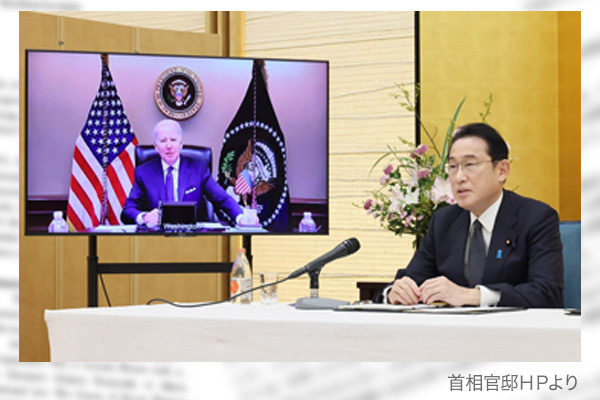Prime Minister Fumio Kishida should forge ahead with Japan’s military buildup, including the acquisition of capabilities to attack enemy bases, in preparation for a contingency in Taiwan that is now under growing Chinese military pressure. In an online Japan-U.S. summit on January 21, Kishida showed a policy of considering all possible options, including the acquisition of capabilities to attack enemy bases, for a new national security strategy to be formulated this year. U.S. President Joe Biden is said to have welcomed the policy.
Japan-U.S. agreement to enhance capabilities to respond
After the summit, Kishida told reporters that he and Biden in their 80-minute talks took considerable time to discuss China. On the Taiwan situation, however, Kishida only said, “We underscored the importance of peace and stability across the Taiwan Strait and encouraged the peaceful resolution of cross-strait issues, but I would like to refrain from discussing any more details.”
“What we do is the Japanese version of ‘hiding talents and storing up internal power,’” said a senior Japanese government official. The phrase was used for China’s foreign and security policy by former leader Deng Xiaoping. “The policy, though looking low-profile, gives emphasis on storing up power,” the official said, adding that this point was tacitly included in a joint statement issued after the Japan-U.S. virtual two-plus-two meeting between the two countries’ foreign and defense ministers on January 7.
At preparatory talks for the two-plus-two joint statement, there was an opinion that a clearer commitment regarding Taiwan should be included into the statement. But the two countries finally agreed to give priority to the enhancement of capabilities to respond to emergency, rather than clinging to Taiwan-related wording that could provoke China, the official said. Regarding Taiwan, the two-plus-two statement noted the two countries “underscored the importance of peace and stability in the Taiwan Strait,” as did a joint statement for a Japan-U.S. summit in April 2021. But the two-plus-two statement also said, “They resolved to work together to deter and, if necessary, respond to destabilizing activities in the region.”
Japanese government officials explained that it was significant to include “respond” as well as “deter.” The April 2021 summit statement only said, “We also recognize the importance of deterrence to maintain peace and stability in the region.” The two-plus-two statement further said with regard to the content of “respond” that the ministers “welcomed our robust progress on evolving Alliance roles, missions and capabilities, and on bilateral planning for contingencies,” clearly indicating they had a Taiwan contingency in their mind. In this way, Japan and the United States have been deepening cooperation in preparing for a Taiwan contingency.
Kishida required to put commitments into action
Since the April 2021 summit statement became the first bilateral summit document to refer to Taiwan in 52 years, Japan has crossed the Rubicon of no return regarding a Taiwan contingency. This month’s two-plus-two and summit meetings further clarified Japan’s direction. Rather than an “ability to listen” that Kishida boasts, the prime minister is required to have an ability to quickly put into action commitments to substantially increase defense spending and acquire capabilities to attack enemy bases.
Takashi Arimoto is a Planning Committee member, Japan Institute for National Fundamentals, and publisher of Monthly Magazine SEIRON at the Sankei Shimbun newspaper.


